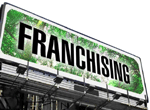
Franchise costs differ based upon the franchise type and industry. The size and location of the franchise also play a factor in the franchise cost. Careful research will reveal that the total investments can range in price from $1000 to several million. Full service restaurants and fast food restaurants are typically the most expensive. Auto repair, mobile based businesses and home-based businesses are more affordable in cost. Affordable franchise options may be found online for consumers to purchase.
What is Required to Purchase a Franchise?
Purchasing a franchise was easier before the recession. Investors could obtain the seed money through a local bank and become profitable within one year or less. Today, good credit scores are required in addition to the financial backing.
There are a variety of ways to obtain funding to cover the costs of franchises. Friends and family are the most obvious and common sources for funding. When a franchise originates with a group of people that want to work together, the business is typically more successful. The sense of ownership is greater, and investors work together to build a solid business. Additional investors may also be solicited to supplement contributions from friends and family.
Many other franchise owners cover their expenses with a small business loan. These loans may be obtained through a bank. Some companies find that local banks with relationships with customers are more likely to provided funding than other national banks.
Examples of Franchise Costs
Most clients will be required to pay a franchise fee, legal fees and contractor fees. The location costs, furniture, fixtures, equipment, signage and inventory may all be included in these franchise costs. Franchise fees are between $20,000 and $50,000 in costs. Some franchises have more affordable fees but most of the lower fees are associated with mobile franchises and home-based franchises.
Franchise Fees.The franchise fee will typically cover the costs of site selection, training and support. Sometimes, the franchise fee is an upfront licensing fee. These fees cover the investor’s right the use the franchise name.
Legal Fees. A franchise attorney may be required to complete the purchasing process of the franchise. Two agreements are typically involved in the franchise purchasing process. The Uniform Franchise Offering Circular (UFOC) and the franchise agreement are the most common documents. Investors should expect to pay between $1500 and $5000 for a franchise attorney. The price will vary depending upon the time spent with the attorney.
Build Out Costs. Each franchise is different in terms of what is required to build-out the costs of the franchise location. An estimate of the build out costs may be obtained from the franchisor of the build out costs. Furniture, fixtures, signage and equipment are included in the cost of the build out fee. Software applications and computers may also be included in the franchise fee.
Inventory. Many businesses require that investors purchase between $20,000 and $150,000. Many businesses require inventory on-hand or stored in a warehouse to keep up with customer demand.
Supplies. Supplies are also required to run a business properly. The supplies may include plastic utensils, paper goods or office supplies. The franchisor may be able to provide an accurate assessment of what is required to open your franchise.
Working Capital. Working capital is required for the daily cash operations of a business. Working capital may need to cover a range of a few months to a few years until the business becomes more profitable. Ask the advice of the franchisor to determine how much working capital may be required for your franchise to become profitable in your selected area.
Remember that if your business runs out of cash, the business will fail. Companies must ensure that they can cover operating costs through all seasons. Investors are advised to have a back-up plan in the event that cash runs low in the business. Advisers recommend doubling the amount that they think they need to adequately run the business. A plan should also be in place to get additional funding if required.
Recurring Costs. Investors may need pay advertising fees to the franchisor in addition to royalties. Other costs may also be incurred after you launch your new business. Businesses should budget for all potential expenses prior to starting a business.
Conclusion
Before purchasing a franchise, factor in all of the costs to avoid cash flow problems later in the future. The franchise cost and associated fees may accumulate quickly. Franchise owners should be prepared to cover any related expenses. With proper planning, franchise ownership may be profitable even during a recession.
